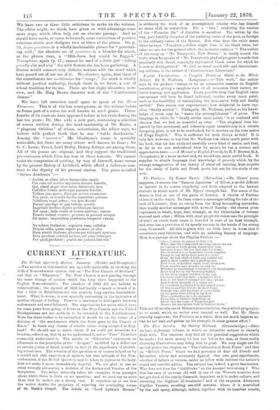CURRENT LITERATURE.
The British Quarterly Review. January. (Hodder and Stoughton.) —Two articles in this number are specially noticeable as showing the drift of Nonconformist opinion, that on "The Free Church of Scotland" and that on " Education." The Freo Church is now passing through the same change of opinion which has long since happened to the English Nonconformists. The seceders of 1843 did not believe in voluntaryism ; the ejected of 1662 had hardly so much as heard of it. But a faith in Establishments can scarcely long survive disestablish- moot. What, however, is now specially interesting is the indication of another change of feeling. There is a tendency to distinguish between endowment and establishment. Tho negotiations for union which have for some years been going on between the Free Church and the United Presbyterians are not unlikely to be extended to the Establishment. Were the three bodies to be reconciled it would bo on the terms of a division of " the emoluments which the State gave to the Church of Knox." Is there any chance of similar terms being accepted in Eng- land? We should not so much object, if we could get securities for freedom,—freedom, that is, as we understand it, not as "Free " Churches commonly understand it. The article on "Education " announces an adherence to the principles of the 'League," modified by a difference on certain points of detail, notably on that of the expediency of abolish- ing school-fees. The solution of the question is of course helped on by a candid and able exposition of opinion, but this attitude of the Non- conformists, if the British Quarterly may be taken to represent the body, does not make it more immediately hopeful. Wo are glad to see an essay strongly advocating a revision of the Authorized Version of the Scriptures. Tho writer naturally takes his examples from passages about which there is little or no question ; and we need say no more than that he makes out a strong case. It surprises us to see that the writer doubts the propriety of rejecting the concluding verses of St. Mark's Gospel. The article on "Lord Lytton's Horace"
is evidently the work of an accomplished scholar who has himself no mean skill in translation. For a "free " rendering the version of the " Phaselus ille " of Catullus is excellent. The writer, by the way, puts forcibly the point of the yachting tastes of the poet, so foreign to the ordinary tastes of the Roman. But what does the critic mean when he says, "Tennyson polishes single lines of his blank verse, but takes no care for the general effect, the inclusive cadence"? The author of the essay on "Mr. Tennyson's New Poems " is surely nearer the truth when he speaks of " Mr. Tennyson's gradual progress towards that peculiarly rich, fluent, cunningly rhythmical blank verse for which he is now so distinguished." We find, as usual, much able and discriminat- ing criticism in the review of " Contemporary Literature."


































 Previous page
Previous page